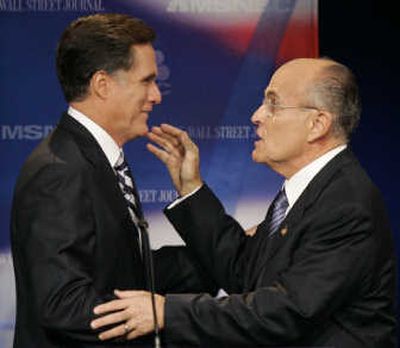Fiscal fracas outshines Thompson

DEARBORN, Mich. – Rudolph Giuliani and Mitt Romney attacked each other’s record of fiscal management Tuesday in a robust back and forth that dominated the Republican debate and took the spotlight off first-time attendee Fred Thompson.
The exchange, which took place with Thompson standing awkwardly in between the two combatants, was the most direct face-to-face clash this year between two candidates for president on either side of the political divide.
Giuliani, the former mayor of New York, touted his record of tax-cutting, saying, “I led, he lagged.” Romney, the former governor of Massachusetts, replied: “It’s baloney. Mayor, you’ve got to check your facts.”
Tuesday’s gathering of the nine Republican presidential candidates marked a coming out of sorts for Thompson, the former Tennessee senator who just entered the race last month. All eyes were on him after a couple of well-publicized gaffes combined with lackluster campaign events and a seeming disinterest in chatting up voters.
Thompson even managed to throw in a joke about his late entry into the race: “I admit, it was getting a little boring without me.”
But despite the intense interest in Thompson’s performance, the two candidates standing on either side of Thompson seemed to overshadow him as they struggled to cement their own place as the leader in the unsettled nominating contest.
The event was billed as an economic forum, set in the home of the troubled auto industry, in a state plagued by double-digit unemployment rates and an exodus of jobs overseas.
For days leading up to the event, Romney and Giuliani have simultaneously bragged about their own records cutting taxes, restraining spending and creating economic growth while in office, and disparaged the other’s record. Romney has described Giuliani’s as “big city, big spending.” Giuliani has described Romney’s as “Taxachusetts hypocrisy.”
Asked about their differences, Giuliani said he had cut taxes 23 times and that he believes in cutting taxes. Romney, however, went on the offensive, saying that tax cuts needed to be matched by spending cuts.
“And the best tool that a governor has and the best tool the president has had is a line item veto,” Romney said. “And Mayor Giuliani took the line item veto that the president had all the way to the Supreme Court and took it away from the president of the United States. I think that was a mistake. “
He continued to flay Giuliani, accusing him of fighting for a $400 million commuter tax on workers coming into New York City, and presiding over consistently high taxes.
“When it’s all said and done, if you’re a New York taxpayer, city taxpayer, your state and city tax combined can reach as high as 10 percent,” said Romney. “And in our state, if you’re a Boston worker, it’s going to be more like 5.3 percent.”
Defending himself, Giuliani said spending went up in Massachusetts under Romney by 8 percent per capita, compared with a drop of 7 percent during his own tenure. “I brought taxes down by 17 percent,” he said. “Under him, taxes went up 11 percent per capita.”
As for the line item veto, Giuliani said the Supreme Court declared it to be unconstitutional.
“I took Bill Clinton to the Supreme Court and beat Bill Clinton. It’s unconstitutional,” he said. “What the heck can you do about that, if you’re a strict constructionist?”
Recognizing the popularity of the line item veto among Republican voters, Giuliani complained that it was not “properly structured,” and that he would actually support a line item veto that passes constitutional muster and allows the president to kill improper, pork-barrel spending projects attached to legislation.
“So you can bang your head up against the stone wall all you want. I am in favor of a line item veto, except you have to do it legally,” he said.
Throughout the debate, the other candidates portrayed themselves as opponents of wasteful spending, willing to make the hard choices to rein in federal entitlements such as Social Security and Medicare.
But only Thompson offered a specific proposal to tie Social Security benefits to inflation rather than wages. “For future retirees, instead of having nothing, which is what they’re headed for under the current situation that’s unsustainable, they would have protection,” he said.
Sen. Sam Brownback, R-Kan., said he would like to see personal Social Security accounts similar to what President Bush proposed.
But Sen. John McCain, R-Ariz., said there is a barrier to fixing Social Security, which provides benefits to every citizen upon retirement. “The American people no longer have trust and confidence in us that we will fix anything,” he said, citing government incompetence with Hurricane Katrina, the war in Iraq and runaway spending.
The debate was sponsored by MSNBC, CNBC and the Wall Street Journal. The candidates also included Texas Rep. Ron Paul, Colorado Rep. Tom Tancredo, California Rep. Duncan Hunter and former Arkansas Gov. Mike Huckabee.